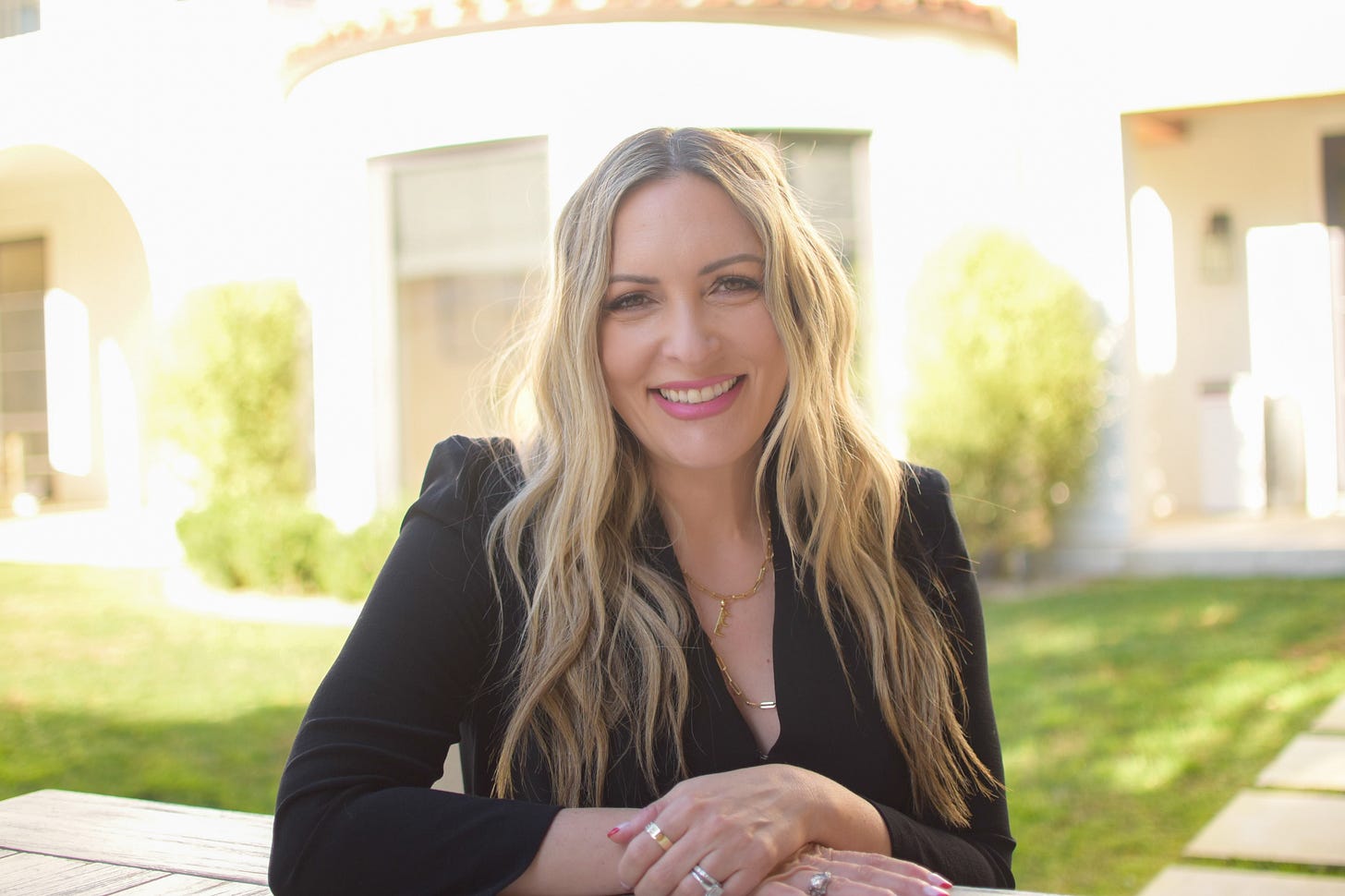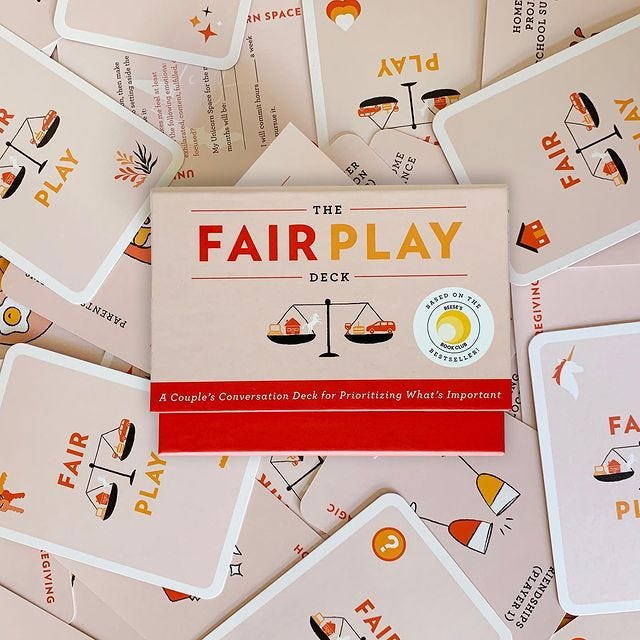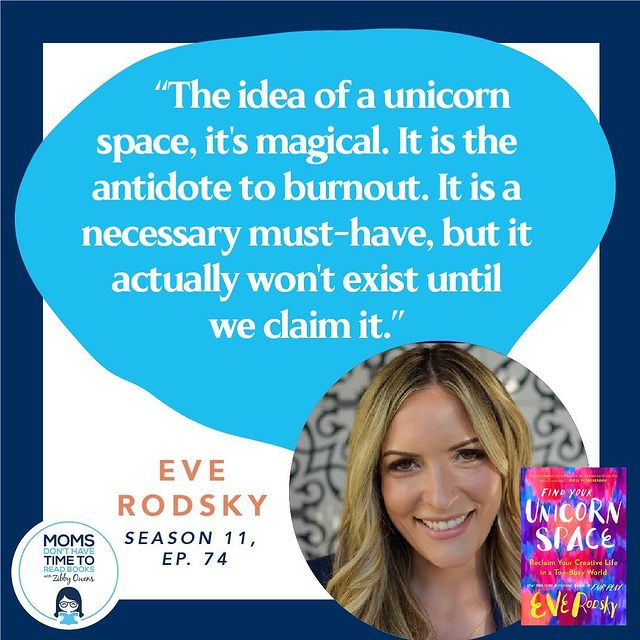Eve Rodsky wants to change the world
On gendered division of labor and the toxicity of domestic fantasies
I first learned of Eve Rodsky’s work when a friend texted me a link to this piece she wrote for Harper’s Bazaar (in which I’m quoted!), with a note saying: “Sounds like something you’d be into” and she was 100% correct.
In the piece, Eve delineates in black and white why America’s problem with gendered division of labor is so toxic.
We expect women to work like they don’t have children and raise children as if they don’t work.
She goes on to explain how the expectation that a woman pursue a career while also doing the vast majority of domestic labor and childcare hurts not only the individual woman, but also her household, her job, and the world.
Eve’s background is in law, and it wasn’t until she found herself burnt out and furious about her own household’s gendered division of labor that she started researching why exactly she felt so stuck. This research grew in scope and reach until it became a book, Fair Play (and very quickly after that, a movement!), which not only is a validating-as-hell read, but a practical toolkit for how all humans might find more autonomy and freedom within their households and their lives.
I knew Eve’s work was revolutionary from the jump, and quickly fell in love with Eve as a person when I interviewed her for this Washington Post piece on how women might escape shouldering the bulk of additional domestic labor during the first wave of the pandemic. I’m pretty sure Eve said “fuck this” to something inherently misogynistic we were discussing in the first five minutes of our phone call, and as someone who believes there are some situations where only profanity is useful, I knew Eve was my type of person, and I couldn’t be more delighted to share her wisdom here today!
Sara: For people that somehow do not know who you are and what you do, can you introduce yourself and tell them about your work?
Eve: I guess what I call myself these days is an expert on the gendered division of labor. Valuing unpaid labor is actually a UN sustainability goal. It’s goal 5.4 and it’s a key component to reaching gender equity. And I just want to preface this by saying that I did not expect to be an expert on gendered division of labor. That wasn’t on my mind in third grade when adults asked me what I wanted to be when I grow up. It wasn't even anything I was thinking about when I went to law school as a Gen-X-er and was told my career would be as amazing or more amazing than the men studying alongside me. I was told I could do it all and simply educate my way out of my working class, Avenue C and 14th Street single parent household. And those are all lies. They’re all lies.
But research is me-search. And so a lot of things that were happening in my own marriage opened my eyes to the huge inequities in many households. As our friend Jess Calarco says, when other countries choose to have social safety nets, in America we choose to have women.
Sara: So you started looking at unequal divisions of labor in your own household, and moved on to researching gendered division of labor in others’ households and lives. And then you wrote a book about your findings. Can you talk a little bit about Fair Play?
Eve: Fair Play was born from the need to fight for federal paid leave and universal childcare, and to undo the damage of the 1980s Reagan era. While we undo all that damage, we have to fight for our own sanity and have our own boundaries. And it's ridiculous to tell women to walk around the block or to take a bubble bath when truly the only boundary that is going to help us is a boundary around our time. And so Fair Play started out as a spreadsheet. Like every Gen X-er or Type-A woman, I want to believe that lists can solve it all. I was really just trying to solve this own issue in my home until I finally realized something really important. We're never going to solve gendered labor issues by focusing on who left the sponge in the sink last. We're not going to be able to do it by using “I” statements when we argue. I would say to Seth, I'm using an “I” statement just like our therapist said - I fucking hate you.
The only thing that's really going to help us solve these issues is recognizing that women are running at a deficit from the moment we wake up because our time has been predetermined for us by society. Women only get three boxes to fit themselves into - if we're lucky. We get to be parents. We get to be partners. We get to be professionals. But God forbid you tried to break out of one of those three boxes and you ask for permission to be unavailable from those roles. If you use your time in ways that don’t feed those into those three roles, society is going to be very, very mad at you, and it will ensure you experience extreme discomfort. In my longest longitudinal study of unpaid labor (over ten years) covering diverse socioeconomic and racial categories, I ask women, “What was the most important thing you did outside of your role as a parent, outside of your role as a partner, and outside your role as a professional?” The majority of women cannot answer that question.
Sara: You mention women operating at a deficit from the moment of waking, but it seems to me we’re operating at a deficit from the moment of birth, right? Because if we’re socialized as female, many of us are taught to view motherhood and wifehood as the pinnacle of our potential achievement, and to view domestic labor as part and parcel of being a good partner and a good mother. I would love you to talk about that thorny intersection between gender and domesticity.
Eve: One of the best ways to end bias is to study history. And we’re really seeing an assault on history right now, with book bannings and other horrific things. But we know that women were welcomed into the workplace in the 1940s. In fact, we spent billions of dollars on childcare to allow them to work when men went to fight in World War II, and then there was a real problem when the men returned. People were really panicked that these women would start to take positions of power that men wanted back. So there was this really interesting period in the 1950s and 1960s when domesticity and Leave it to Beaver domestic norms became the end-all and be-all. The myth of the ideal housewife was pushed by ads, and women were told that housewifery and domesticity could really liberate them. And then in the late 60s, women entered male professions at a record rate. But the problem was, we never reset the Overton window on our cultural expectations of women in the home.
So while it was a necessity for women to go back to work, our cultural expectations of women being best suited to domestic lifestyles live on even today. Pew studies show that 62% of Americans want one parent in the home (AKA a woman). The majority of Americans still think the best family structure includes one-stay-at-home parent. So even though the landscape has shifted, and of course, women are in the workplace, and have been since the 60s, we’ve never really convinced America that our family structures should deviate from the so-called ideals of the 1950s and 1960s. Cultural assumptions have not kept us with women’s progress.
In my early days of attending Davos (this is pre-pandemic), I tried to explain that unpaid labor is preventing women from reaching the C suites. Women are burnt out. They're literally dying. We see hair loss, increases in disease and chronic stress. Women are numbing themselves with “mommy juice.” I would say, “We're one crisis away from losing 30-40 years of women's labor force participation.” And nobody cared. Because they were operating from a belief that women should be in the workforce to begin with. That’s domesticity for you. It’s toxic. Because of income inequality, we can't live like that. But we want women to live like that. Especially white women.
Sara: Obviously, I study my momfluencer culture, and on the one hand, I see such incredible things being done by women like Laura Danger, who’s blowing up social media by educating folks on unpaid labor and gender roles. And then on the other hand, we’re seeing a resurgence of retrograde gender norms celebrated on trad mom accounts.
Eve: Unlearning is hard. It's much easier to follow or learn from somebody that is not pushing against culture. So those women might be adopting 1950s and 1960s cultural stereotype—which again, is the stereotype that 62% of Americans still believe is the right stereotype for American women to conform to—because it feels easier. The Laura Dangers of the world and the people pushing back against cultural stereotypes, and pushing against norms, they are going to have a harder time. And I think we will always see women who are complicit in their own oppression. By the way, that was me! I would probably say that I was doing more harm than good prior to my own wake-up call. I really believed 12 years ago that Seth’s time was more valuable than my own time. And I protected his time.
I’d say these things to justify protecting his time.
Seth makes more money than me.
My job is more flexible so I should be the one picking up all the unpaid labor: picking up the kids from school when they're sick, starting my workday later, which makes no sense because my job is so much more important. It's always been more important. I’ve always been a lawyer in the nonprofit sector. Seth works in private equity. So looking at time as money was me being complicit in my own oppression.
I thought it was a better multitasker. I thought women's brains were wired differently for care. That's complete bullshit. Neuroscientists will tell you there's no gender difference in multitasking.
Lastly, I would tell myself that in the time it takes me to tell Seth what to do, it would be easier for me to do it myself. I would say to myself, Seth is better at focusing on task at a time, and I can find the time to get x, y, or z done. Look Sara, we're not Albert Einstein, right? We can't fuck with the space time continuum! There's literally no way to “find time,” but this was how I justified spending my hours in service of Seth and my family. Until I had my Fair Play breakthroughs, I was probably a lot more like those trad mom influencers you mentioned than the Laura Dangers of the world.
Sara: Your work really speaks to how gender inequities in the home can erode a household. Both partners suffer when the domestic responsibilities are not shared equally. And I really love how you lay out the framework of Fair Play and explain the end goal: which is to exist as an individual outside of one’s role as wife, caretaker, or worker. I feel like this is a great time to talk about Unicorn Space.
Eve: Absolutely, there has to be an end goal. Because Fair Play isn’t enough. I would say to women after they’d incorporated Fair Play into their lives, like, Look, you’re finally getting your time back! And then it was like a horror movie (for me, anyway), because women would say to me, Well, what do I do with that time? And I was like, What are you talking about? You're telling me you don't know how to use your own time? You're just gonna do more work or join the PTA or have another kid? What are you talking about? And of course, these are privileged narratives, to even get to a point where you are confronted with this type of choice. But it was really making me upset.
I love this one story. One woman told me that Fair Play helped her and her husband realize that her vagina wasn’t a magical oracle that whispered in her ear what her husband's mother wanted for Christmas. These type of assumptions harm any heteronormative couple, but they also harm single parents who get hit with the motherhood penalty; employers assume they can’t be good workers because of their single parenthood status. It also hurts LGBTQIA couples who are asked things like, “Who’s the man in this relationship and who’s the woman?” We’re really screwing everybody with these heteronormative assumptions.
And we all need an end goal so we’re prepared to lean into our own power as women, and for men to step into their full power as caregivers. We need to know what we want to do with our time. And as we've been hearing lately, rest is resistance. What’s also resistance is this idea that you deserve to be unavailable from being a partner, parent, or professional. And numbing can not be the answer. The only answer is to be consistently interested in our own lives. We cannot just spend our time binge watching Netflix or grabbing drinks with a friend. These are fantastic things, but we also have to really think about our value systems and the active pursuits that make us who we are or who we want to become. And that's harder.
Sara: Yeah, it is way harder. I can totally understand why so many people have no clue what to do them themselves once they have more time, because we spend so much of our lives attending to the needs and desires of others, especially as moms
Eve: I asked this very powerful CEO what her Unicorn Space was. I explained it was an active pursuit that makes you you. It's something that excites you when you wake up. And she said her Unicorn Space was “shopping.” And I was like, no, no, no, no, no, no, no, no. Unicorn Space really ties to our obsession with happiness, which is a really bad obsession. You can see it clearly in momfluencer culture, wellness culture, flawed versions of “self-care.”
When we say, “I just want to be happy,” or even of your child, “I just want them to be happy,” it’s a little sociopathic, right? Instead, we should be aiming to experience the appropriate emotion at the appropriate time and have the strength to weather it. That’s the true definition of mental health. And if you believe in that definition of mental health, then you can view Unicorn Space as your umbrella to help you weather your emotions. And it can be a flimsy umbrella like alcohol, or it can be a really strong umbrella comprised of active values that engage your curiosity and connect you with others. And it needs to be something you can complete.
Sara: I’m thinking again of the gendered spheres and how men have so many built in Unicorn Spaces. I’m thinking a lot about golf.
Eve: Let’s talk about golf. Men have found a hack since the 1600s or whenever golf was invented and golf is really an ideal Unicorn Space.
They get to experience a sense of wonder and curiosity – “will I get the ball in the hole?”
They get to do it in groups. It's not a solo sport. So they get to connect with others and share themselves with the world.
And they get to complete something at the end of 18 holes.
Curiosity, connection, completion. Golf is a Unicorn Space.
Sara: And I guess we really have to carve out our Unicorn Spaces more deliberately as women, right? Because no one is going to offer them up for us.
Eve: 100%. This is where I love Dr. Becky Kennedy's work so much. She and I always talk about the fact that when you claim your time back for yourself, you do not get a fucking parade. I want to be very clear and say that, you do not get your partner's oh my god I'm so happy for you that you don't spend Sundays with us anymore and you spend Sundays rowing on the Charles River. You don't get your kids saying I'm so happy you missed my recital this Saturday because you were at your own dance performance, mom. It doesn't work that way.
Instead, you’re going to get: I thought you just went on a trip. Or: Mom, all the other parents are always there and you’re not. You're going to get other people's discomfort placed on you. And your boundary is to recognize that that shit is not yours. Do not take it. As Becky Kennedy says, “serve that shit back” like you would on the tennis court.
Sara: Shifting gears here. I think mothers are really awakening to the fact that we've been fed this lie that self-optimization will make us whole, and if you just focus on what you eat, what you wear, how you exercise, whatever, you will be happy and your family will be happy. I think many of us are realizing that actually collectivity and community care is the only way all humans will have equitable shots at living fulfilling lives. How do you balance creating equity within your insular family universe while also being a good community member in the bigger world?
Eve: Fair Play is mutual aid. Because it's asking for help. And it's recognizing that asking for help is frowned upon in our society. But Fair Play recognizes that you might have 100 cards of unpaid labor, and one person can not hold all 100 of those cards. Fair Play is not self-help. It's mutual aid. It's a book and system that requires your community to come and step in. And some people get very triggered by the book, because it requires external people to change alongside you. These people need to do things like: tell your schools not to call you first when your kid is sick or tell the pediatrician that mom isn’t the default point person any more. By bucking the system and throwing away assumptions of care work and domestic labor, you are engaged in a political act. The personal is political, right? So the more we shine a light on these issues, and show men in care, we're going to change society, because there's going to be more people who are sympathetic to causes like paid leave and access to childcare.
There was this really powerful man who hired me because he wanted to create a big gender equity program at his tech company. He told me he wanted to sponsor all of these single mothers on his team and for them to hold positions of leadership. And I was like, This is amazing. And then, 20 minutes later, I remembered to ask him about his own family structure. And he said to me, Well, you know, we just moved out of the city to Greenwich. And you know, in order for me to travel for work, I really needed someone at home so I could do this job. On and on. And so then I said, No offense to you, but I need you to understand that what you just said to me over the past 20 minutes or whatever revealed that those single mothers you care so much about can’t do your job. Because you just told me you can't do your job without your wife staying home. And that's the issue here. Gender equity in the workplace is not going to happen until we get empathetic leadership. And you cannot get empathetic leadership if you are someone who relies on a stay-at-home partner and you’re only surrounded by other individuals relying on their stay-at-home partners. It’s both, and. You buck the trend in your own home by not being complicit in your own oppression, and not falling prey to assumptions. And by making structured decisions about your own life, which is Fair Play. And by recognizing that all time is created equal, which is Unicorn Space.
Sara: I think you're also pointing out the need for systemic and structural change as well. Because a Black single mother of three working multiple jobs is facing structural, systemic racism and facing a dearth of opportunities as a result. Add to that the fact that partnered people are still prioritized above non-partnered people in our culture.
Eve: Of course. There's not even a question that we need infrastructural safety nets. I will say that interestingly, when I polled folks, people who identified as working-class or poor were more easily able to identity their Unicorn Spaces than people in the upper classes.
Sara: Fascinating.
Eve: And that has been consistent over 10 years of research.
Sara: And why do you think that is?
Eve: I think influencer culture is partly to blame. I think that as you get higher up the ladder, you stop chasing activities rooted in your value system. Whether it’s community, religion, connection, baking clubs, reading groups. It becomes so individualistic. You're chasing the new Tesla, and the nicer house, and a performative dinner party. And gradually your own values disappear amongst the priorities and expectations foisted on you by society and the culture around you.
Sara: That makes so much sense. And you're also participating more in aspirational, consumeristic parenting culture.
Eve: 100%. People I’ve spoken to who identify as poor or working class would tell me they had no idea what “Pinterest perfect parenting” was. They’re doing their best at their jobs but they’re also saying they’ll never give up on their bowling league. It was a lot harder for the people who self-identified as being in the 1% to tell me about their Unicorn Space. I thought that having more privilege would’ve led people to greater understandings of themselves outside of their roles as parent, worker, and partner, but I didn’t find that at all.
Sara: Wow. Anything else you want to add about anything we haven’t covered?
Eve: I do want to be very clear that I’m not blaming any single woman for anything. If you've been one of those people who has fed herself toxic time messages (like I was feeding myself for so long), of course you’re doing that! Because you've been conditioned since birth to believe your time isn’t valuable. Society has told you things like “breastfeeding is free” when it’s actually an 1800 hour per year job. Society tells you that your time is less valuable by lowering salaries once women (and especially women of color) enter traditionally male-dominated professions. We’re fed so many messages that contribute to us believing our time is less valuable. So pushing against that narrative requires collective movement. Women's time is valuable, and we do not have to shoulder all of the unpaid labor in our homes. It's not our fate.













Damn. Mind blown.
Everything I read from both you and Eve Rodsky opens my eyes. Thank you for this.
I especially felt called out by the part about existing outside of mother, partner, worker. I felt exactly this last night but could not articulate it properly. To myself I labelled it "spiritually malnourished", knowing that what I wanted to do was something creative but lacking the energy after a full weekend of parenting and partnering. I feel validated about the creative pursuits I've been trying to incorporate into my life. And I definitely need to read Find Your Unicorn Space.